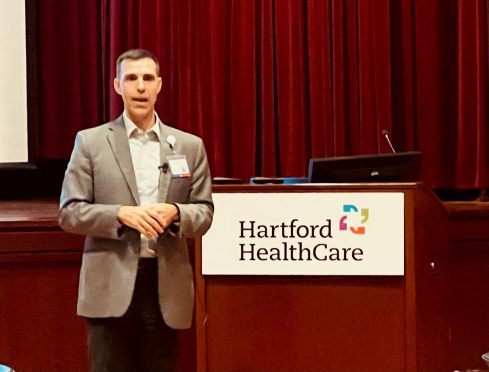<< Back
Opioid Symposium Offers Insight and Guidelines

October 19, 2022
The 2022 Opioid Symposium “Then and Now: Changes in Guidelines to Manage Pain,” had something for everyone faced with the complex clinical and treatment challenges associated with the ongoing opioid epidemic.
Presented by the Hartford HealthCare Opioid Stewardship Council last weekend at Heublein Hall, the event provided evidence-based education that included safe opioid tapering, perioperative treatment and identifying addiction. Participants also took an in-depth look at new Centers for Disease Control and Prevention guidelines, opioid sparing pain management techniques and non-opioid alternatives for pain management.
HHC Chief Academic Officer Rocco Orlando, MD, opened the day by detailing several successes at HHC including a 50% reduction in prescribing opioids in the last five years and the creation of many useful dashboards for monitoring opioid use.
Medication-assisted treatment facilities continue to be established, he said, with peer counselors more prevalent in HHC emergency departments. There has also been an increase in access and prescribing of Nalaxone to help prevent overdoses.
Keynote speaker Travis N. Rieder, PhD, an author and research scholar at Johns Hopkins’ Berman Institute of Bioethics, spoke about his personal journey of opioid dependence and what he feels should be done to better understand and help patients facing possible addiction.
An early breakout session hosted by Juan Ruiz, MD, addressed the difficult questions and answers needed to help patients needing withdrawal treatment who seek more opioids. He advised prescribing what providers are comfortable with, bringing in psychology assistance when needed, and how to best understand the intents of a patient who may harm themselves.

Another session presented by Justin Sleeper, MSN, RN, addressed the benefits of learning and using motivational interviewing with patients to help determine the root cause of their behavior. This included using open-ended questions, affirmations that point out strengths, reflective listening, summarizing, and sharing information and data with clients.
“When conducting the interview, it’s important to get the person to talk as much as possible and let them go where they need to go,” Sleeper said.
Eric Secor, MD, PhD, ended the day presenting on the many benefits of integrated and lifestyle medicine now being employed to help reduce pain. Their use has grown throughout HHC and helps with many issues associated with opioid treatment and recovery, including chronic pain, stress management and insomnia, he said.